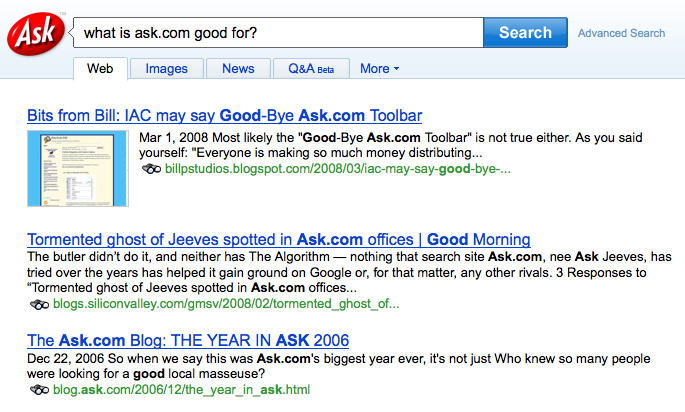What do you say to an old friend who’s over extending themselves yet again? This morning 3rd tier search engine Ask.com proudly tooted its horn one more time – “It’s Here! The New Ask.com!“

Ask.com is a decent search engine, it does a lot of things well enough to check out once and appreciate before moving on. (Maps, for example.) I use its Blogsearch all day long. I like Ask and many of the innovative things it does, but not enough to use many of its tools with any regularity. Today the search engine relaunched, saying it now leverages Semantic Technologies. Upon performing some searches though – I can’t tell what’s different. I just wish they’d stop.
In its blog post today, the company says:
Presenting direct answers to your searches, front and center, has always been at the heart of the Ask.com experience, and we push further down that path today with the introduction of three new answer technologies: DADS, DAFS, and AnswerFarm.
Didn’t anyone ever teach Erik Collier, Ask VP of Product Management, that it’s rude to drop acronyms in conversation without defining them? He never does in the announcement. It makes you look pretentious, unless you are a perpetual also-ran after years in your field and millions spent advertising – then it just makes you look silly. By DAFS I presume they mean Document Attribute Format Specification (or did they mean Direct Access File System?), I can’t find a mention of DADS in 40 semantic web blogs we follow and presumably AnswerFarm is the new Q&A tab. So the new Ask.com brings acronyms for superior performance to the table.

The Q&A tab is cute. I tried a wide range of questions and it gave me nothing but ads. If I grunted a phrase at it, then the AnswerFarm offered some Questions on that topic that I might not have thought to ask. Entertaining, educational and a bit like flipping through an Encyclopedia with a celebrated but totally non-functioning table of contents.
Just a few months ago it was reported that Ask decided to focus on the Question and Answer paradigm because it’s popular with existing users. Today’s announcement appears consistent with that – though semantic parsing of the questions being asked is a lot less impressive than semantic analysis of the pages being indexed by the search engine. According to an eWeek profile this morning, Ask is showcasing its ability to understand the meaning of search queries, even if the words are jumbled. It sounds like “semantic web” more in the flavor of Powerset than Yahoo Search Monkey – and presumably Ask didn’t spend Powerset-like cash to do the same level of research.
What Ask Does Right
I like Ask’s Blogsearch a lot. It offers a very clear value proposition. It places a premium on blog feeds that have been subscribed to in the company’s popular feed reader Bloglines. That cuts down on spam and offers all kinds of intriguing possibilities for discovering who the top bloggers are who write about certain keywords. I’m not kidding when I say I use it all day, every day.
These incessant “relaunches” of Ask.com’s primary site are getting really old, though. Relaunches and stupid ad campaigns just aren’t cutting it. Ask should focus on doing something they can really compete in. The AnswerFarm tab could be a good one, if it worked better.
















